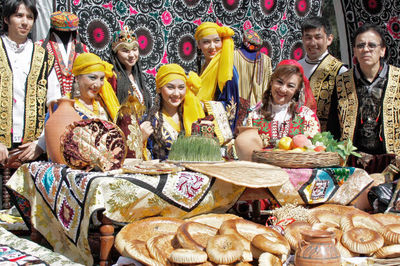Nowruz (also spelled Navruz and Noruz), literally meaning new day, marks the beginning of spring across a vast geographical area and is celebrated as the first day of the New Year in several countries annually on March 21st, the spring equinox when daylight and darkness are of equal length.
In the Achaemenian era, people and officials commemorated Nowruz in the form of an annual tradition everywhere – at home and in Persepolis. Persepolis - "City of Persians" - was the ceremonial capital of the Achaemenid Empire, where Nowruz was celebrated in ancient times.
In the present world, the feast was initially registered on the UNESCO List of the Intangible Cultural Heritage of Humanity in 2009, as a common tradition for the Azerbaijan Republic, India, Iran, Kyrgyzstan, Pakistan, Turkey, and Uzbekistan.
A year later, the United Nations General Assembly named March 21st the International Day of Nowruz.
More than 300 million people in Central Asia and the Caucasus, the Middle East, the Black Sea Basin, and the Balkans celebrate the holiday.
The history of Nowruz, as referred above, can be traced back more than 3,000 years in Iran, from where it eventually spread to West and Central Asia.
According to UNESCO, Nowruz promotes the values of peace and solidarity between generations and within families, as well as reconciliation and neighborliness, thus contributing to cultural diversity and friendship among peoples and various communities.
Nowruz traditions vary from place to place, ranging from leaping over fires and streams in Iran to tightrope walking, lighting candles at house doors, traditional games such as horse racing, or the traditional wrestling practiced in Kyrgyzstan.

Nowruz traditions in Uzbekistan
The Nowruz holiday in Uzbekistan is one of the popular celebrations in the country where people love gathering for different events and festivals.
Uzbekistan has its own special traditions for Nowruz. From ancient times, the holiday was celebrated in agricultural oases with festivals, bazaars, horse racing, and dog and cockfights.
Traditional sports competitions attract many audiences in the rural areas of Uzbekistan. The most popular ones include equestrian tournaments, horseback wrestling, and the national game ‘Kupkari’, in which two teams on horseback battle over a goat carcass.
Many Uzbeks believe that good deeds will bring a fortune in the new year, so they try to forgive their enemies, avoid arguments and extend help to those in need during the holiday. They also welcome many guests into their homes and visit others as well.
Another symbol associated with the traditional New Year in Uzbekistan is abundance, a quality most keenly experienced in the baking and sharing of holiday treats.
Sumalak (a wheat bran pudding) is a dish cooked exclusively for the spring festival of Nowruz and thus available for tasting only once a year. Sumalak is very tasty, invigorating, and restores one’s strength lost in the course of the winter.

Cooking Sumalak is a very interesting ritual. It aims to prepare a tasty meal and also foster mutual support and unity. Traditionally this was the time when grains of wheat were put into the soil, some part of which was reserved for the cooking of Sumalak, the main dish of Nowruz. Each family put their share of grains into the cauldron, bringing a handful of sprouting grains to where people were boiling Sumalak altogether.
The custom has continued to the present time and when Sumalak is ready, they share it with neighbors and friends.
They also believe that if one tasted Sumalak from seven cauldrons in one season, they would become happy. And the fact that most of the people manage to do it indicates that people still share what they have - the happiness of living, receiving the spring, and celebrating Nowruz - with their neighbors, relatives, and friends.
Halisa is another 'must do' for Nowruz. In Tashkent, this speciality is known as Halim. This wonderful dish is perfect for meat-eaters.
The Nowruz table is very rich and not limited to Sumalak and Halisa, although these are substantial and seem enough to feed several mahallas in the city. Families also cook Samsa, Barak Beirok (a kind of fried ravioli), Pirojki filled with potatoes, and the most important Bichak – savoury pastries filled with green vegetables.
Same as other countries, Nowruz in Uzbekistan plays a significant role in strengthening the ties among peoples based on mutual respect and the ideals of peace and good neighborliness.
Source: Mehr News Agancy

